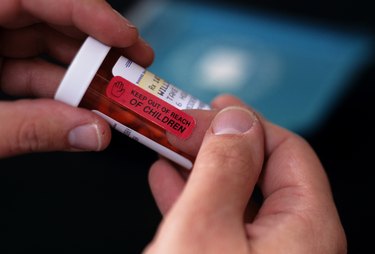
Heart rate is controlled by electrical impulses that travel through contractile heart muscle and when there is a defect in the heart tissue, contractions can greatly increase. According to the Mayo Clinic, a healthy adult heart beats between 60 and 100 times per minute when at rest. A rapid heartbeat, or tachycardia, can be a temporary and normal response to stimuli, such as fear or stress, but many causes of tachycardia are serious and even life-threatening. Tachycardia has the potential to increase the risk of stroke, heart attack and sudden cardiac arrest, but there are medications to help treat the effects of tachycardia.
Antiarrhythmics
Video of the Day
Antiarrhythmic medication works to slow and stabilize heart rhythm by decreasing abnormal firing of the heart's electrical system, according to Peacehealth.org. The atrioventricular (AV) node is a part of the electrical impulse system that coordinates the electricity that runs between the upper and lower chambers of the heart. Some antiarrhythmic medications reduce the number of impulses that can pass through the AV node and thereby reduces heart rate.
Video of the Day
Beta Blockers
Beta-blocking medication interferes with the specific receptors in heart muscle that normally would cause an increase in heart rate and force of contraction. These medications, such as propranolol (Inderal) and esmolol (Brevibloc), can reduce stress on the heart and mediate its tendency to beat faster than normal.
Anti-Anxiety Medication
Anxiety is a relatively common cause of a rapid heartbeat and doctors may attempt to treat the tachycardia by reducing anxiety with medication. Many of these medications have serious side effects and can be physically addicting, but can be very helpful in temporarily reducing anxiety, according to Helpguide.org.
Calcium Channel Blockers
The heart requires calcium to perform a contraction and calcium channel blockers can interfere with both the force and rate of contraction. These medications do this by reducing the hearts contractibility and lowering blood pressure, both of which reduce stress on the heart.
Anticoagulants
Some people who have tachycardia that is ongoing are at an increased risk of developing blood clots that may lead to a stroke or heart attack, according to Mayo Clinic. A doctor may prescribe medication that prevents rapid blood clotting, known as blood thinners or anticoagulants, to reduce the risk of these life-threatening complications.
Digoxin
Digoxin, also known as digitalis, is a medication that is derived from the leaves of a digitalis plant, according to Drugs.com. Digoxin helps those with tachycardia by slowing down and controlling heart rate, but digoxin may take weeks or months to begin having an effect.